How Not to Get Plantar Warts
 Plantar warts are growths on the feet caused by a virus. The virus can be contracted in moist, warm environments like gym locker rooms or around an indoor pool. If you have cuts on your feet take extra special care to avoid any contact with these surfaces. Make sure to change your socks everyday and never share them with others. Plantar warts are typically not painful at first, but as they grow they can hurt when you walk. If you notice the wart while it is small, there are various types of home remedies that may be effective. However, once the plantar wart grows larger, a podiatrist will be your best option.
Plantar warts are growths on the feet caused by a virus. The virus can be contracted in moist, warm environments like gym locker rooms or around an indoor pool. If you have cuts on your feet take extra special care to avoid any contact with these surfaces. Make sure to change your socks everyday and never share them with others. Plantar warts are typically not painful at first, but as they grow they can hurt when you walk. If you notice the wart while it is small, there are various types of home remedies that may be effective. However, once the plantar wart grows larger, a podiatrist will be your best option.
Plantar warts can be very uncomfortable. If you need your feet checked, contact one of our podiatrists from Memorial Podiatry, PLLC. Our doctors will assist you with all of your foot and ankle needs.
About Plantar Warts
Plantar warts are the result of HPV, or human papillomavirus, getting into open wounds on the feet. They are mostly found on the heels or balls of the feet.
While plantar warts are generally harmless, those experiencing excessive pain or those suffering from diabetes or a compromised immune system require immediate medical care. Plantar warts are easily diagnosed, usually through scraping off a bit of rough skin or by getting a biopsy.
Symptoms
- Legions on the bottom of your feet, usually rough and grainy
- Hard or thick callused spots
- Wart seeds, which are small clotted blood vessels that look like little black spots
- Pain, discomfort, or tenderness of your feet when walking or standing
Treatment
- Freezing
- Electric tool removal
- Laser Treatment
- Topical Creams (prescription only)
- Over-the-counter medications
To help prevent developing plantar warts, avoid walking barefoot over abrasive surfaces that can cause cuts or wounds for HPV to get into. Avoiding direct contact with other warts, as well as not picking or rubbing existing warts, can help prevent the further spread of plantar warts. However, if you think you have developed plantar warts, speak to your podiatrist. He or she can diagnose the warts on your feet and recommend the appropriate treatment options.
If you have any questions please feel free to contact our office located in Houston, TX. We offer the newest diagnostic and treatment technologies for all your foot and ankle needs.
Read more about All About Plantar WartsCaring For Your Feet: What Not to Miss
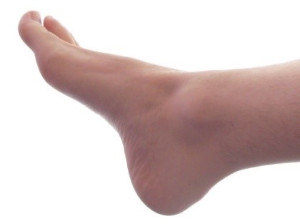 Since we spend a great majority of our lives on our feet, we should take utmost care of them. Experts suggest stretching the feet can reduce many issues imposed on our feet as they can suffer from a variety of ailments. The most obvious sign of a foot issue is pain. While pain without injury can be easily ignored, a lack of treatment can lead to serious chronic pain such as plantar fasciitis or arthritis. Discolored skin on the foot should not go untreated. A biopsy is usually done when the area is asymmetrical, has irregularities around the edges, and is larger than five millimeters. Numbness, swelling, and cold feet are all early symptoms of various foot issues that should not be overlooked if ongoing. Athlete’s foot and other fungal infections of the foot are often first noticed as an itchy foot. Fungal infections can be treated over-the-counter, but should be diagnosed by a professional if conditions worsen or persist.
Since we spend a great majority of our lives on our feet, we should take utmost care of them. Experts suggest stretching the feet can reduce many issues imposed on our feet as they can suffer from a variety of ailments. The most obvious sign of a foot issue is pain. While pain without injury can be easily ignored, a lack of treatment can lead to serious chronic pain such as plantar fasciitis or arthritis. Discolored skin on the foot should not go untreated. A biopsy is usually done when the area is asymmetrical, has irregularities around the edges, and is larger than five millimeters. Numbness, swelling, and cold feet are all early symptoms of various foot issues that should not be overlooked if ongoing. Athlete’s foot and other fungal infections of the foot are often first noticed as an itchy foot. Fungal infections can be treated over-the-counter, but should be diagnosed by a professional if conditions worsen or persist.
Everyday foot care is very important to prevent infection and other foot ailments. If you need your feet checked, contact one of our podiatrists from Memorial Podiatry, PLLC. Our doctors can provide the care you need to keep you pain-free and on your feet.
Everyday Foot Care
Often, people take care of their bodies, face and hair more so than they do for their feet. But the feet are a very important aspect of our bodies, and one that we should pay more attention to. Without our feet, we would not be able to perform most daily tasks.
It is best to check your feet regularly to make sure there are no new bruises or cuts that you may not have noticed before. For dry feet, moisturizer can easily be a remedy and can be applied as often as necessary to the affected areas. Wearing shoes that fit well can also help you maintain good foot health, as well as making it easier to walk and do daily activities without the stress or pain of ill-fitting shoes, high heels, or even flip flops. Wearing clean socks with closed shoes is important to ensure that sweat and bacteria do not accumulate within the shoe. Clean socks help to prevent Athlete’s foot, fungi problems, bad odors, and can absorb sweat.
If you have any questions please feel free to contact our office located in Houston, TX. We offer the newest diagnostic and treatment technologies for all your foot and ankle needs.
Read more about Every Day Foot CareVirtual Reality Helps to Prevent Falls
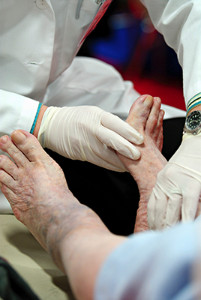 The use of technology has drastically transformed the way we do things, even in the world of medicine. With a combination of virtual reality and treadmill training, an Israeli study shows that this may be an effective way to prevent dangerous falls associated with aging. Currently, this collaboration of virtual reality and treadmill techniques focus on improving muscle strength, balance, and gait. This Israeli research team, in conjunction with partners across Europe, have found that physical mobility and cognition are important for safe walking, and that participants reduced their risk of falling for at least six month post-training.
The use of technology has drastically transformed the way we do things, even in the world of medicine. With a combination of virtual reality and treadmill training, an Israeli study shows that this may be an effective way to prevent dangerous falls associated with aging. Currently, this collaboration of virtual reality and treadmill techniques focus on improving muscle strength, balance, and gait. This Israeli research team, in conjunction with partners across Europe, have found that physical mobility and cognition are important for safe walking, and that participants reduced their risk of falling for at least six month post-training.
Proper foot care is something many older adults forget to consider. If you have any concerns about your feet and ankles, contact one of our podiatrists from Memorial Podiatry, PLLC. Our doctors can provide the care you need to keep you pain-free and on your feet.
The Elderly and their Feet
As we age we start to notice many changes in our body, but the elder population may not notice them right away. Medical conditions may prevent the elderly to take notice of their foot health right away. Poor vision is a lead contributor to not taking action for the elderly.
Common Conditions
- Neuropathy – can reduce feeling in the feet, and can hide many life threating medical conditions.
- Reduced flexibility – prevents the ability of proper toenail trimming, and foot cleaning. If left untreated, it may lead to further medical issues.
- Foot sores – amongst the older population can be serious before they are discovered. Some of the problematic conditions they may face are:
- Gouging toenails affecting nearby toe
- Shoes that don’t fit properly
- Pressure sores
- Loss of circulation in legs & feet
- Edema & swelling of feet and ankles
Susceptible Infections
Diabetes and poor circulation can cause general loss of sensitivity over the years, turning a simple cut into a serious issue.
If you have any questions please feel free to contact our office located in Houston, TX. We offer the newest diagnostic and treatment technologies for all your foot and ankle needs.
Read more about Elderly and their FeetFlat Feet in Children
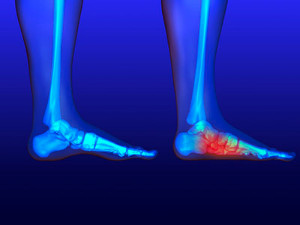 Flat foot is a condition that commonly affects young children, caused by a collapse in the medial longitudinal arch of the foot and sagging of the heel valgus. In most cases, the condition resolves itself as the child grows older; the arch typically forms between the third and fifth years of life. Diagnosis of the condition involves the careful examination of the child’s foot, ankle, and joints. The child may be asked to dangle their feet in the air or stand on their tiptoes. Treatment often revolves around monitoring the condition for possible progression, as the condition can correct itself as previously mentioned.
Flat foot is a condition that commonly affects young children, caused by a collapse in the medial longitudinal arch of the foot and sagging of the heel valgus. In most cases, the condition resolves itself as the child grows older; the arch typically forms between the third and fifth years of life. Diagnosis of the condition involves the careful examination of the child’s foot, ankle, and joints. The child may be asked to dangle their feet in the air or stand on their tiptoes. Treatment often revolves around monitoring the condition for possible progression, as the condition can correct itself as previously mentioned.
Flatfoot is a condition many people suffer from. If you have flat feet, contact one of our podiatrists from Memorial Podiatry, PLLC. Our doctors will treat your foot and ankle needs.
What are Flat Feet?
Flatfoot is a condition in which the arch of the foot is depressed and the sole of the foot is almost completely in contact with the ground. About 20-30% of the population generally has flat feet because their arches never formed during growth.
Conditions & Problems:
Having flat feet makes it difficult to run or walk because of the stress placed on the ankles.
Alignment – The general alignment of your legs can be disrupted, because the ankles move inward which can cause major discomfort.
Knees – If you have complications with your knees, flat feet can be a contributor to arthritis in that area.
Symptoms:
- Pain around the heel or arch area
- Trouble standing on the tip toe
- Swelling around the inside of the ankle
- Flat look to one or both feet
- Having your shoes feel uneven when worn
Treatment:
If you are experiencing pain and stress on the foot you may weaken the posterior tibial tendon, which runs around the inside of the ankle.
If you have any questions please feel free to contact one of our office located in Houston, TX. We offer the newest diagnostic and treatment technologies for all your foot and ankle needs.
Read more about Flat FeetHigh Heels Lead to Pain
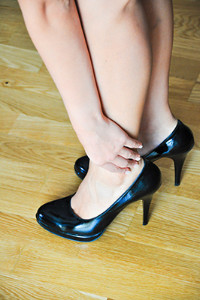 One of the most common causes of foot pain for women stems from the frequent wearing of high heels. Though they may be stylish, heels can contribute to all sorts of problems. Due to the angle that the foot is forced to maintain, circulation can be slowed or even cut off. This can lead to leg muscle issues, a stiffened Achilles tendon, and resulting spasms and pain. If you are suffering any kind of pain from wearing high heels, consult a doctor. In the meantime, try to limit the amount of time that you wear them. If you have to wear heels for work, take them off as soon as you get home. Stretching may also help some of the symptoms, but reducing the amount of walking around you do in high heels is the best way to prevent the pain.
One of the most common causes of foot pain for women stems from the frequent wearing of high heels. Though they may be stylish, heels can contribute to all sorts of problems. Due to the angle that the foot is forced to maintain, circulation can be slowed or even cut off. This can lead to leg muscle issues, a stiffened Achilles tendon, and resulting spasms and pain. If you are suffering any kind of pain from wearing high heels, consult a doctor. In the meantime, try to limit the amount of time that you wear them. If you have to wear heels for work, take them off as soon as you get home. Stretching may also help some of the symptoms, but reducing the amount of walking around you do in high heels is the best way to prevent the pain.
High heels have a history of causing foot and ankle problems. If you have any concerns about your feet or ankles, contact one of our podiatrists from Memorial Podiatry, PLLC. Our doctors can provide the care you need to keep you pain-free and on your feet.
Effects of High Heels on the Feet
High heels are popular shoes among women because of their many styles and societal appeal. Despite this, high heels can still cause many health problems if worn too frequently.
Which parts of my body will be affected by high heels?
- Ankle Joints
- Achilles Tendon – May shorten and stiffen with prolonged wear
- Balls of the Feet
- Knees – Heels cause the knees to bend constantly, creating stress on them
- Back – They decrease the spine’s ability to absorb shock, which may lead to back pain. The vertebrae of the lower back may compress.
What kinds of foot problems can develop from wearing high heels?
- Corns
- Calluses
- Hammertoe
- Bunions
- Morton’s Neuroma
- Plantar Fasciitis
How can I still wear high heels and maintain foot health?
If you want to wear high heeled shoes, make sure that you are not wearing them every day, as this will help prevent long term physical problems. Try wearing thicker heels as opposed to stilettos to distribute weight more evenly across the feet. Always make sure you are wearing the proper shoes for the right occasion, such as sneakers for exercising. If you walk to work, try carrying your heels with you and changing into them once you arrive at work. Adding inserts to your heels can help cushion your feet and absorb shock. Full foot inserts or metatarsal pads are available.
If you have any questions please feel free to contact our office located in Houston, TX. We offer the newest diagnostic and treatment technologies for all your foot and ankle needs.
Read more about Effect of High Heels on the FeetSoftening Corns and Calluses for Removal
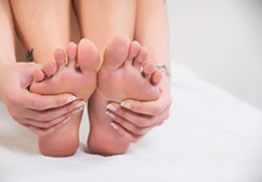 Among foot conditions, corns and calluses are often seen as some of the more harmless concerns. Regardless, if a corn or callus does become troublesome, there are methods available for removal. Because calluses are essentially small areas of thick, hardened skin, softening calluses can help aid in their removal. Soaking the feet in warm water and avoiding using harsh soaps while washing can help maintain softness of the skin. Hard areas can also be buffed away using a pumice stone. If you are suffering from corns and calluses and seek ways to remove them, consult with your podiatrist.
Among foot conditions, corns and calluses are often seen as some of the more harmless concerns. Regardless, if a corn or callus does become troublesome, there are methods available for removal. Because calluses are essentially small areas of thick, hardened skin, softening calluses can help aid in their removal. Soaking the feet in warm water and avoiding using harsh soaps while washing can help maintain softness of the skin. Hard areas can also be buffed away using a pumice stone. If you are suffering from corns and calluses and seek ways to remove them, consult with your podiatrist.
If you have any concerns regarding your feet and ankles, contact one of our podiatrists of Memorial Podiatry, PLLC. Our doctors will treat your foot and ankle needs.
Corns: What are they? And how do you get rid of them?
Corns can be described as areas of the skin that have thickened to the point of becoming painful or irritating. They are often layers and layers of the skin that have become dry and rough, and are normally smaller than calluses.
Ways to Prevent Corns
There are many ways to get rid of painful corns such as wearing:
- Well-fitting socks
- Comfortable shoes that are not tight around your foot
- Shoes that offer support
Treating Corns
Treatment of corns involves removing the dead skin that has built up in the specific area of the foot. Salicylic acid can help in getting rid of these corns because it dissolves keratin, which is the protein that makes up a good majority of corns. Podiatrists recommend that people with diabetes not use salicylic acid but should consult with their podiatrist regarding the treatment of corns.
If you have any questions, please feel free to contact one of our offices located in Houston, TX. We offer the newest diagnostic and treatment technologies for all your foot care needs.
A Common Cause of Chronic Heel Pain
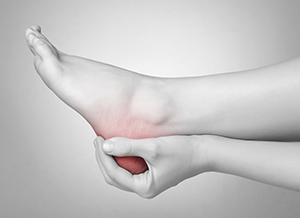 Heel pain is a condition that plagues many people, and chronic cases of the condition can be especially difficult to endure. For many common cases of chronic heel pain, plantar fasciitis is the underlying culprit; plantar fasciitis affects all types of people, though most commonly active men between the ages of 40 and 70. Plantar fasciitis pain manifests in various ways. For some people, it can be described as a dull pain; in other cases, people feel it as a sharp pain or a burning sensation or ache that extends outward from the heel. There are various factors that can contribute to plantar fasciitis; to determine the cause of your heel pain and the best way to treat it, consult with your podiatrist.
Heel pain is a condition that plagues many people, and chronic cases of the condition can be especially difficult to endure. For many common cases of chronic heel pain, plantar fasciitis is the underlying culprit; plantar fasciitis affects all types of people, though most commonly active men between the ages of 40 and 70. Plantar fasciitis pain manifests in various ways. For some people, it can be described as a dull pain; in other cases, people feel it as a sharp pain or a burning sensation or ache that extends outward from the heel. There are various factors that can contribute to plantar fasciitis; to determine the cause of your heel pain and the best way to treat it, consult with your podiatrist.
Many people suffer from bouts of heel pain. For more information, contact one of our podiatrists of Memorial Podiatry, PLLC. Our doctors can treat your foot and ankle concerns.
Causes of Heel Pain
● Heel pain is often associated with plantar fasciitis. The plantar fascia is a band of tissues that extends along the bottom of the foot. A rip or tear in this ligament can cause inflammation of the tissue.
● Achilles tendonitis is another cause of heel pain. Inflammation of the Achilles tendon will cause pain from fractures and muscle tearing. Lack of flexibility is also another symptom.
● Heel spurs are another cause of pain. When the tissues of the plantar fascia undergo a great deal of stress, it can lead to ligament separation from the heel bone, causing heel spurs.
Why Might Heel Pain Occur?
- Wearing ill-fitting shoes
- Wearing non-supportive shoes
- Weight change
- Excessive running
Treatments
Heel pain should be treated as soon as possible for immediate results. Keeping your feet in a stress free environment will help. If you suffer from Achilles tendonitis or plantar fasciitis, applying ice will reduce the swelling. Stretching before an exercise like running will help the muscles. Using all these tips will help make heel pain a thing of the past.
With the advancements in technology and greater knowledge of how muscles and joints work, physical therapists can turn things around dramatically.
If you have any questions, please feel free to contact our office located in Houston, TX. We offer the newest diagnostic and treatment technologies for all your foot care needs.
The Effects of Wearing Shoes too Small
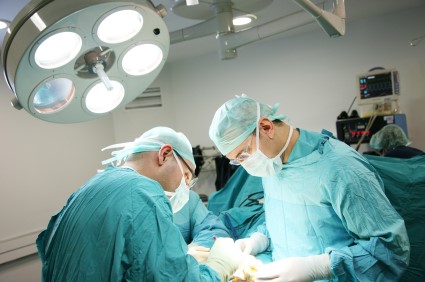 In a recent study focusing on the effects of shoes on women’s feet, 88% of the women included were wearing shoes that were too small for their feet. 356 women were included in the study. Most of the women had not re-measured their feet in over ten years, and over 50% stated that they experienced daily foot pain from their shoes. Wearing shoes that are too tight can make way for the development of foot conditions such as bunions, hammertoes, corns, and calluses, and can even result in surgery for the treatment or removal of such conditions. Surgery is often seen as the final option for the treatment of many of these conditions; to lessen the possibility of surgery and the development of these conditions in general, always wear shoes of the proper size.
In a recent study focusing on the effects of shoes on women’s feet, 88% of the women included were wearing shoes that were too small for their feet. 356 women were included in the study. Most of the women had not re-measured their feet in over ten years, and over 50% stated that they experienced daily foot pain from their shoes. Wearing shoes that are too tight can make way for the development of foot conditions such as bunions, hammertoes, corns, and calluses, and can even result in surgery for the treatment or removal of such conditions. Surgery is often seen as the final option for the treatment of many of these conditions; to lessen the possibility of surgery and the development of these conditions in general, always wear shoes of the proper size.
Foot surgery is sometimes necessary to fix a foot ailment. To learn more, contact one of our podiatrists of Memorial Podiatry, PLLC. Our doctors can provide the care you need to keep you pain-free and on your feet.
When Is Surgery Necessary?
Foot and ankle surgery is generally reserved for cases in which less invasive, conservative procedures have failed to help with the problem. Some of the cases in which surgery may be necessary are:
● Removing foot deformities like bone spurs and bunions
● Severe arthritis that has caused bone issues
● Cosmetic reconstruction
What Types of Surgery Are There?
The type of surgery you receive will depend on the nature of the problem you have. Some of the possible surgeries include:
● Bunionectomy for painful bunions
● Surgical fusion for realignment of bones
● Neuopathy decompression surgery to treat nerve damage
Benefits of Surgery
Although surgery is usually a last resort, it can provide more complete pain relief compared to non-surgical methods and may allow you to finally resume full activity.
Surgical techniques have also become increasingly sophisticated. Techniques like endoscopic surgery allow for smaller incisions and faster recovery times.
If you have any questions, please feel free to contact our office located in Houston, TX. We offer the newest diagnostic and treatment technologies for all your foot care needs.
Diabetes Could Lead To Amputations
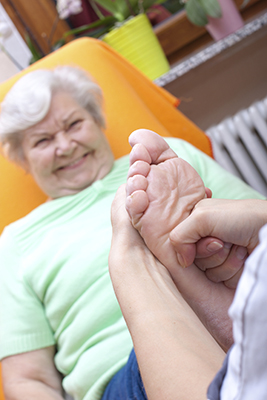 For those who have been diagnosed with Diabetes, or those with family members who have, taking care of your feet is something that should be taken very seriously. Because of the lack circulation in the feet and legs, numbness can occur. This could prevent noticing that there is even a problem. That, coupled with inordinately slow healing, can cause infections to persist, spread, and even lead to amputation. Make sure to look out for signs of foot problems. If you have numbness, sores, or any type of slow-healing wound, see a doctor immediately.
For those who have been diagnosed with Diabetes, or those with family members who have, taking care of your feet is something that should be taken very seriously. Because of the lack circulation in the feet and legs, numbness can occur. This could prevent noticing that there is even a problem. That, coupled with inordinately slow healing, can cause infections to persist, spread, and even lead to amputation. Make sure to look out for signs of foot problems. If you have numbness, sores, or any type of slow-healing wound, see a doctor immediately.
Diabetic foot care is important in preventing foot ailments such as ulcers. If you are suffering from diabetes or have any other concerns about your feet, contact one of our podiatrists of Memorial Podiatry, PLLC. Our doctors can provide the care you need to keep you pain-free and on your feet.
Diabetic Foot Care
Diabetes affects millions of people every year. Diabetes can damage blood vessels in many parts of the body, including the feet. Because of this, taking care of your feet is essential if you have diabetes, and having a podiatrist help monitor your foot health is highly recommended.
The Importance of Caring for Your Feet
● Routinely inspect your feet for bruises or sores.
● Wear socks that fit your feet comfortably.
● Wear comfortable shoes that provide adequate support.
Patients with diabetes should have their doctor monitor their blood levels because blood sugar levels play such a huge role in diabetic care. Monitoring these levels on a regular basis is highly advised.
It is always best to inform your healthcare professional of any concerns you may have regarding your feet, especially for diabetic patients. Early treatment and routine foot examinations are keys to maintaining proper health, especially because severe complications can arise if proper treatment is not applied.
If you have any questions, please feel free to contact one of our offices located in Houston, TX. We offer the newest diagnostic and treatment technologies for all your foot care needs.
Americans Typically Walk 75,000 Miles by Age 50
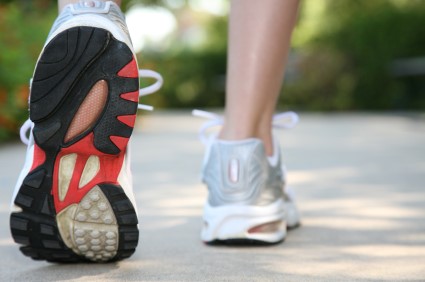 By the time the average American reaches age 50, they are expected to have accumulated 75,000 miles on their feet. If you’re an avid runner, you may have more miles on your feet, so it’s especially important to optimize proper foot care. Knowing your body type, running style, your feet and the kinds of activity you routinely follow are all aspects to consider when maintaining foot care. Proper footwear is also vital in making sure that your feet are comfortable and healthy. Our feet change as we age, expanding and potentially becoming flatter.
By the time the average American reaches age 50, they are expected to have accumulated 75,000 miles on their feet. If you’re an avid runner, you may have more miles on your feet, so it’s especially important to optimize proper foot care. Knowing your body type, running style, your feet and the kinds of activity you routinely follow are all aspects to consider when maintaining foot care. Proper footwear is also vital in making sure that your feet are comfortable and healthy. Our feet change as we age, expanding and potentially becoming flatter.
Exercising your feet regularly with the proper foot wear is a great way to prevent injuries. If you have any concerns about your feet, contact one of our podiatrists of Memorial Podiatry, PLLC. Our doctors can provide the care you need to keep you pain-free and on your feet.
How to Prevent Running Injuries
Many common running injuries are caused by overuse and overtraining. When the back of the kneecap starts wearing out and starts causing pain in your knee, this is commonly referred to as runner’s knee. Runner’s knee is a decrease in strength in your quadriceps and can occur if you’re not wearing properly fitted or supporting shoes. To prevent runner’s knee, focusing on hip strengthening is a good idea, as well as strengthening your quads to keep the kneecaps aligned.
What Are Some Causes of Running Injuries?
- One cause of a common running injury is called iliotibial band syndrome.
- Plantar fasciitis is also another common injury.
- Stress fractures can occur from overtraining, lack of calcium, or even your running style.
Best Ways to Prevent Running Injuries
- Wear footwear that fits properly and suits your running needs.
- Running shoes are the only protective gear that runners have to safeguard them from injury.
- Make a training schedule. Adding strengthening exercises as well as regular stretching can help keep you strong and limber and can lessen the possibility of injuries.
- Stretching keeps muscles limber, this will help you gain better flexibility.
If you have any questions, please feel free to contact one of our offices located in Houston, TX. We offer the newest diagnostic and treatment technologies for all your foot care needs.
More...
How to Tell If You Have Plantar Fasciitis
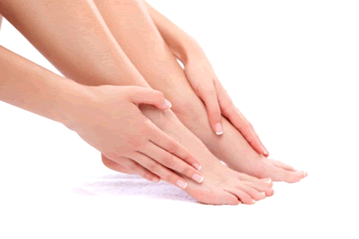 If you’re experiencing stiffness and pain in the soles of your feet that typically becomes more prominent during the mornings, you may have plantar fasciitis. Plantar fasciitis can be described as a foot condition that results from overuse of the plantar fascia, the tissue that runs along the soles of your feet. Excessive stress on this area can lead to inflammation. Being overweight, having flat feet or high arches, pregnancy and improper footwear such as flip flops are also factors in the development of plantar fasciitis. Treat your condition by icing your feet, stretching your muscles and having proper rest by avoiding any strenuous activity.
If you’re experiencing stiffness and pain in the soles of your feet that typically becomes more prominent during the mornings, you may have plantar fasciitis. Plantar fasciitis can be described as a foot condition that results from overuse of the plantar fascia, the tissue that runs along the soles of your feet. Excessive stress on this area can lead to inflammation. Being overweight, having flat feet or high arches, pregnancy and improper footwear such as flip flops are also factors in the development of plantar fasciitis. Treat your condition by icing your feet, stretching your muscles and having proper rest by avoiding any strenuous activity.
Plantar fasciitis can be very painful and inconvenient. If you are experiencing heel pain or symptoms of plantar fasciitis, contact one of our podiatrists of Memorial Podiatry, PLLC. Our doctors can provide the care you need to keep you pain-free and on your feet.
What is Plantar Fasciitis?
Plantar fasciitis is the inflammation of the thick band of tissue that runs along the bottom of your foot, known as the plantar fascia, and causes mild to severe heel pain.
What Causes Plantar Fasciitis?
· Excessive running
· Non-supportive shoes
· Overpronation
· Repeated stretching and tearing of the plantar fascia
How Can It Be Treated?
· Conservative measures – anti-inflammatories, ice packs, stretching exercises, physical therapy, orthotic devices
· Shockwave therapy – sound waves are sent to the affected area to facilitate healing and are usually used for chronic cases of plantar fasciitis
· Surgery – usually only used as a last resort when all else fails. The plantar fascia can be surgically detached from the heel
While very treatable, plantar fasciitis is definitely not something that should be ignored. Especially in severe cases, speaking to your doctor right away is highly recommended to avoid complications and severe heel pain. Your podiatrist can work with you to provide the appropriate treatment options tailored to your condition.
If you have any questions, please feel free to contact one of our offices located in Houston, TX. We offer the newest diagnostic and treatment technologies for all your foot care needs.
All About Stress Fractures
 The fifth metatarsal is the long bone that connects to the pinky toe on the outside of the foot. This bone is especially prone to fracture for people involved in any sort of prolonged physical activity, especially team sports. This is one of the most common injuries in soccer, but many other athletes also suffer this injury. It is vitally important to never ignore any type of foot pain, on the field or off. Professionally, there is immense pressure to perform, which can lead to dependency on prescription painkillers. But the truth is, we all need our feet, not just star athletes. The best course of action is always to contact a podiatrist and get to the root of the problem.
The fifth metatarsal is the long bone that connects to the pinky toe on the outside of the foot. This bone is especially prone to fracture for people involved in any sort of prolonged physical activity, especially team sports. This is one of the most common injuries in soccer, but many other athletes also suffer this injury. It is vitally important to never ignore any type of foot pain, on the field or off. Professionally, there is immense pressure to perform, which can lead to dependency on prescription painkillers. But the truth is, we all need our feet, not just star athletes. The best course of action is always to contact a podiatrist and get to the root of the problem.
Activities where too much pressure is put on the feet can cause stress fractures. To learn more, contact one of our podiatrists of Memorial Podiatry, PLLC. Our doctors can treat your foot and ankle concerns.
Dealing with Stress Fractures of the Foot and Ankle
The Stress Fractures occur on the foot and ankle when muscles in these areas weaken from too much or too little use. Then the feet and ankles lose support when walking or running from the impact of the ground. Since there is no protection the bones receive the full impact of each step. The stress on the feet causes cracks to form in the bones, thus called stress fractures.
What are Stress Fractures?
Stress fractures occur frequently in individuals whose daily activities cause great impact on the feet and ankles. Stress factors are most common among:
-runners
-people affected with Osteoporosis
-play tennis or basketball
-gymnastics
-high impact workouts
Symptoms
Pain from the fractures occur in the area of the fractures, and can be constant or intermittent. It will often cause sharp or dull pain with swelling and tenderness. Engaging in any kind of activity which involves in high impact will aggravate pain.
If you have any questions, please feel free to contact our office located in Houston, TX. We offer the newest diagnostic and treatment technologies for all your foot care needs.
CDC Releases Report on Arthritis
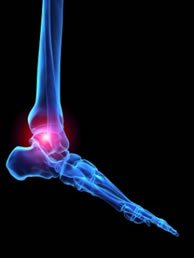 Arthritis is a condition that affects not only the hands and wrists, but feet and ankles as well. There are more than 50 million people in the US that are currently diagnosed with arthritis and there are a lot of different opinions on how to effectively treat the disease. Frequently it is difficult to parse through what does work and what doesn’t. Arthritis can be painful, especially when it affects the foot and ankle area. When trying to manage this pain, it is important to be informed on what types of treatments are effective, keeping in mind that some can actually be harmful. The CDC has recently released a report that outlines some good and bad treatments for this chronic ailment.
Arthritis is a condition that affects not only the hands and wrists, but feet and ankles as well. There are more than 50 million people in the US that are currently diagnosed with arthritis and there are a lot of different opinions on how to effectively treat the disease. Frequently it is difficult to parse through what does work and what doesn’t. Arthritis can be painful, especially when it affects the foot and ankle area. When trying to manage this pain, it is important to be informed on what types of treatments are effective, keeping in mind that some can actually be harmful. The CDC has recently released a report that outlines some good and bad treatments for this chronic ailment.
Arthritis can be a difficult condition to live with. If you are seeking treatment, contact one of our podiatrists of Memorial Podiatry, PLLC. Our doctors can provide the care you need to keep you pain-free and on your feet.
Arthritic Foot Care
Arthritis is a joint disorder that involves inflammation of different joints in your body, such as in your feet. Arthritis is often caused by a degenerative joint disease and causes mild to severe pain in all affected areas. On top of this, swelling and stiffness in the affected joints can also be a common symptom of arthritis.
In many cases, wearing ill-fitting shoes can worsen the effects and pain of arthritis. Wearing shoes that have a lower heel and extra room can help your feet feel more comfortable. In cases of rheumatoid arthritis, the arch in your foot may become problematic. Buying shoes with proper arch support that contour to your feet can help immensely.
Alleviating Arthritic Pain
· Exercises that stretch the foot can prevent further pain and injury and increase mobility
· Most of the pain can be alleviated with anti-inflammatory drugs, heat, and topical medications
· Massages can help to temporarily alleviate pain.
It is best to see your doctor for the treatment that is right for your needs and symptoms. Conditions vary, and a podiatrist can help you determine the right method of care for your feet.
If you have any questions, please feel free to contact one of our offices located in Houston, TX. We offer the newest diagnostic and treatment technologies for all your foot care needs.
Kyle Crutchmer Recovering from Right Foot Injury
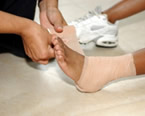 Senior Kyle Crutchmer of Oklahoma State University’s wrestling team had his season cut short due to an injury to his right foot. Nevertheless, he still has a great chance to achieve All-American status for the second time at the 174-pound weight class. Six of Oklahoma State University’s matchups are against preseason top 25 teams, four of which are also in the top 10. In regards to the upcoming competition, Crutchmer states, “We’ve been training all summer and fall for this.”
Senior Kyle Crutchmer of Oklahoma State University’s wrestling team had his season cut short due to an injury to his right foot. Nevertheless, he still has a great chance to achieve All-American status for the second time at the 174-pound weight class. Six of Oklahoma State University’s matchups are against preseason top 25 teams, four of which are also in the top 10. In regards to the upcoming competition, Crutchmer states, “We’ve been training all summer and fall for this.”
Sports related foot and ankle injuries need proper treatment before players can go back to their regular routines. For more information, contact one of our podiatrists of Memorial Podiatry, PLLC. Our doctors can provide the care you need to keep you pain-free and on your feet.
Sport Related Foot and Ankle Injuries
Foot and ankle injuries are a common occurrence when it comes to athletes of any sport. While many athletes dismiss the initial aches and pains, the truth is that ignoring potential foot and ankle injuries can lead to serious problems. As athletes continue to place pressure and strain the area further, a mild injury can turn into something as serious as a rupture and may lead to a permanent disability. There are many factors that contribute to sports related foot and ankle injuries, which include failure to warm up properly, not providing support or wearing bad footwear. Common injuries and conditions athletes face, including:
● Plantar Fasciitis
● Plantar Fasciosis
● Achilles Tendinitis
● Achilles Tendon Rupture
● Ankle Sprains
Sports-related injuries are commonly treated using the RICE method. This includes rest, applying ice to the injured area, compression and elevating the ankle. More serious sprains and injuries may require surgery, which could include arthroscopic and reconstructive surgery. Rehabilitation and therapy may also be required in order to get any recovering athlete to become fully functional again. Any unusual aches and pains an athlete sustains must be evaluated by a licensed, reputable medical professional.
If you have any questions please feel free to contact our office located in Houston, TX. We offer the newest diagnostic and treatment technologies for all your foot and ankle needs.

 (713) 722-0136
(713) 722-0136 

